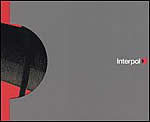|
|
 |
Dusted Reviews
Artist: Interpol Album: Interpol Label: Matador Review date: Jun. 10, 2002 |

|
|
|
 |
I confess I’m excited about Interpol, but an explanation of my particular lack of objective perspective should preempt any observations regarding this new addition to the mod-rock pantheon. My critical quandary is such: an apologist for the unapologetically English, I have a weakness for British rock and its requisite posturing that transcends nostalgia and, hopefully, fetishism. I remain the only person I know who does not write for NME and is not Richard Ashcroft to consider The Verve’s A Storm in Heaven among the crowning pop achievements of the nineteen-nineties. And the queen’s England is all over this Interpol affair, in aspects ranging from a hopeless somnambular fixation to suits and narrow neckties. The sound, the texture, even the climate of this band is trans-Atlantic, 20 years gone. Their first recording was, suitably enough, a 12” contribution to Chemikal Underground’s FukdID series, and I’d be surprised if Rough Trade hasn’t been all over their shit.
Perhaps a minor point of interest is that Interpol is from New York City, and Matador’s fledgling, re-staked claim to mainstream indie domination. But as the erstwhile garage rock calamity plots furtively along, these Jarvis Cocker-looking chumps have been honing adept references to emotion-laden British post-punk. Much will be made, no doubt, of frontman Paul’s evident affinity for all things Ian Curtis, from obtuse lyricism (“We’re moving now, we’re taking control”) to penetrating wail and timbre. Interpol, fortunately, are less interested in doing something necessarily new than in doing it well, and their domestic debut, a three-track precursor to their upcoming full-length, is an accessible exercise in seamless, sincere pop.
Book-ending the effort are “PDA” and “Specialist”, both brazen, driving cuts, with all the high drama of mid-eighties R.E.M. This is almost, but not entirely, the band’s defining style: their sound is too clean, and their agenda too harmonic, to accommodate the type of guitar work that characterizes their NYC peers. Interpol is a guitar band that opts not to foreground the guitar solo, but rather to achieve momentum in building percussion, subtle chord progression, and minor tempo shifts. The only element lacking in dexterity is the bass, which usually hovers in a static range when it could be jolting the songs further forward. These two tracks, and most of the material in their live repertoire, share a certain anonymous dynamic. Sparing tradition and common decency a qualitative comparison, the effect is similar to that on Echo and the Bunnymen’s Heaven Up Here: the songs are too good, too consistent, and too similar to extract one from the mix. It’s hard to imagine Interpol sustaining this through an entire album as intricately as the Bunnymen did, but the odd flight into the balladesque, represented here by “NYC”, alleviates the responsibility. The median track brings the EP to a sort of blissful inertia, extending the band’s range to encompass walls of harmonic feedback and break-heavy percussion.
Lyrically, the Interpol EP achieves a transient success, which works well with the mild ambition of the compositions themselves. Interpol’s is a stylized depression, the affected grievances and emotional nonsense of the self-disinherited. But so long as legitimate poets are in short supply, let alone crowding the rehearsal spaces of the Lower East Side, I remain content with the surprisingly colorful imagery these three songs put forward. Like anyone with the leisure of scrutiny and a certain imaginative attention to detail, Interpol excels in the romanticization of ephemera. Everything from couches and sidewalks to the subway system are duly noted, and promptly elevated to one esoteric function or another. Meanwhile, I’m content knowing someone is committed to the psychological upkeep of the city’s infrastructure.
By Tom Roberts
|







